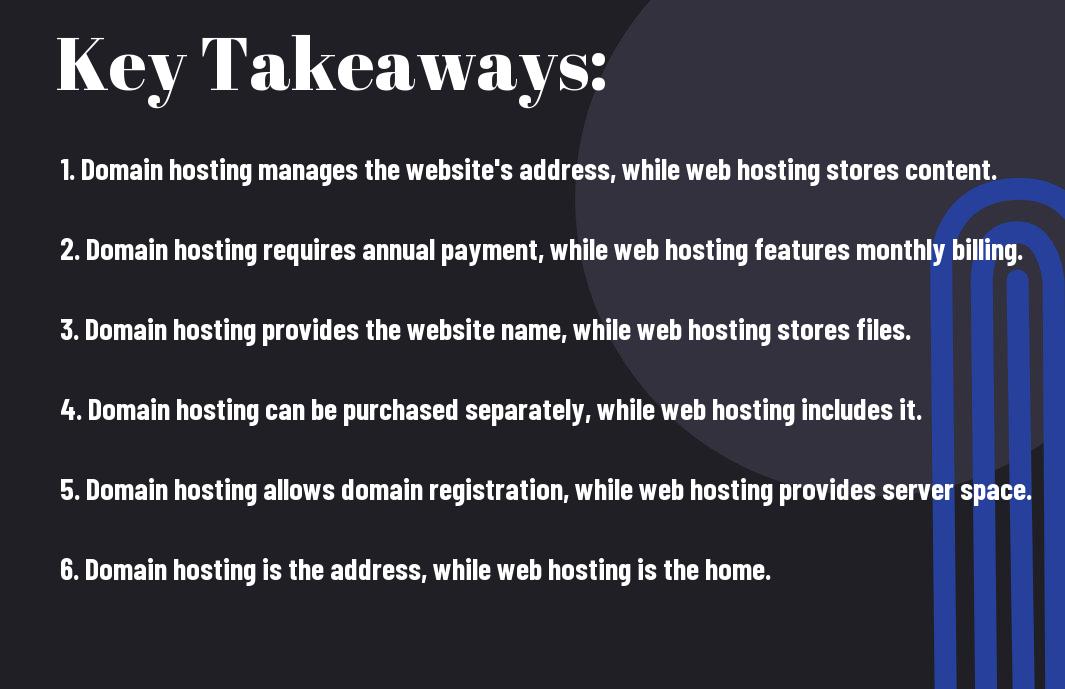Have you ever wondered about the differences between domain hosting and web hosting? It’s a crucial distinction to understand, especially when you’re setting up a website. Domain hosting refers to the service that allows you to register and manage your unique website address, while web hosting is the service that actually stores and serves up the content on your website. Put simply, your domain is your address, and your web host is the plot of land where your website actually sits. Understanding these two components is essential for anyone looking to establish a strong online presence. Not getting a grip on this information can lead to costly mistakes when it comes to managing your website.
Key Takeaways:
- Domain hosting is the service that provides the domain name and allows you to register and manage it, while web hosting is the service that stores your website’s data and makes it accessible to users on the internet.
- When you purchase domain hosting, you are essentially renting the rights to use a specific domain name, whereas web hosting involves renting space on a server to store your website’s files and data.
- It’s important to understand the difference between domain hosting and web hosting in order to properly set up and manage your website, as they are two separate services that work together to make your website accessible to the public.


Exploring Domain Hosting
Some people get confused when it comes to understanding the difference between domain hosting and web hosting. If you’re one of them, you may find it helpful to check out this What’s the Difference Between Domain and Hosting? [Guide] to gain a better understanding.
Definition and Function of Domain Hosting
Domain hosting refers to the service that allows you to host your website with a unique domain name. When you have domain hosting, your website will be associated with a specific domain name, such as www.yourbusinessname.com. The primary function of domain hosting is to provide a permanent address for your website on the internet, making it easily accessible to your visitors.
Registering and Managing Domain Names
When it comes to registering and managing domain names, you need to carefully select a domain name that aligns with your brand and is easy for your audience to remember. It’s important to choose a domain name that reflects your brand identity and is relevant to your business. Once you have registered your domain name, you will need to manage it by renewing it before it expires to ensure that it remains yours. Failure to renew your domain name could result in someone else acquiring it, which could have negative consequences for your brand.
Impact of Domain Hosting on Brand Identity
Your domain name plays a crucial role in shaping your brand identity. It is often the first thing that your potential customers will see, and it can leave a lasting impression. A memorable domain name that accurately represents your brand can have a positive impact on your business, making it easier for people to find, remember, and recommend your website. On the other hand, a confusing or irrelevant domain name could tarnish your brand image and make it harder for people to connect with your business.
Understanding Web Hosting
Not everyone understands the concept of web hosting, but it is a crucial part of launching a website. Web hosting is essentially the place where all the files and data that make up your website are stored and made accessible to the public on the internet. When someone types in your website’s domain name, the web hosting server delivers the content of your site to their browser.
The Role of Web Hosting Providers
When you sign up for a web hosting service, you are essentially renting space on a server where your website’s files are stored and made accessible to the public. The web hosting provider is responsible for maintaining the server, ensuring its security, and providing technical support to address any issues that may arise. They play a vital role in ensuring that your website is accessible to your audience at all times.
Types of Web Hosting Solutions
When it comes to web hosting, there are several types of hosting solutions available for you to choose from. These include shared hosting, virtual private server (VPS) hosting, dedicated server hosting, and cloud hosting. Each type has its own set of features and benefits, catering to different website needs. Recognizing the differences between these options will help you determine which one is most suitable for your website.
| Hosting Solution | Description |
|---|---|
| Shared hosting | Multiple websites share a single server, making it cost-effective but may slow down performance. |
| VPS hosting | A virtual private server offers more control and dedicated resources, at a higher cost. |
| Dedicated server hosting | Your website is the only one hosted on the server, providing maximum performance and control at a premium price. |
| Cloud hosting | Uses multiple virtual servers to host your website, offering scalability and reliability. |
Technical Aspects of Web Hosting
When it comes to the technical aspects of web hosting, it’s essential to understand concepts such as bandwidth, storage space, security features, and uptime guarantees. Bandwidth refers to the amount of data that can be transferred to and from your website within a given time period, while storage space determines the amount of files and data you can store on the server. Security features, such as SSL certificates and malware protection, are crucial for safeguarding your website and your visitors’ data. Uptime guarantees ensure that your website is accessible to users without any interruptions. Understanding these technical aspects will help you make informed decisions when selecting a web hosting provider.
Comparing Domain Hosting and Web Hosting
After understanding the basic definitions of domain hosting and web hosting, it’s time to dive into a detailed comparison of the two. For a comprehensive breakdown of the differences between domain hosting and web hosting, you can read more about it in this Domain vs Hosting: Definition and Differences guide.
| Domain Hosting | Web Hosting |
| Responsible for providing domain name registration services. | Responsible for storing website files and making them accessible online. |
| Does not directly impact website performance. | Significantly impacts website performance, uptime, and loading speed. |
Key Distinctions in Services and Roles
When it comes to domain hosting, its primary role is to provide domain registration services. In contrast, web hosting is responsible for storing website files and making them accessible online. It is important to understand the key distinctions in the services and roles of these two hosting types, as they play a crucial part in the overall performance and accessibility of your website.
How Both Hosting Services Interact
Understanding how domain hosting and web hosting interact with each other is crucial for ensuring a seamless online presence. While domain hosting deals with your website’s address, web hosting stores and delivers the content of your website to your visitors. It is essential to recognize the significance of both hosting services and how they complement each other to maintain a successful online presence.
Choosing the Right Hosting Services
To ensure that your website runs smoothly and effectively, it’s essential to choose the right hosting services. When it comes to domain name vs web hosting: what’s the difference, it’s important to understand that domain hosting and web hosting are two distinct services that you will need for your website. Domain hosting is the service that allows you to register and manage your domain name, while web hosting is the service that actually stores your website’s files and makes them accessible to visitors online.
Factors to Consider When Selecting Hosting Services
When selecting hosting services for your website, there are several factors to consider. First, consider the reliability and uptime of the hosting provider. You want your website to be accessible to visitors at all times, so choosing a hosting provider with a strong track record of reliability is crucial. Another important factor is the security measures in place. You want to ensure that your website and its data are safe from potential threats. Additionally, consider the bandwidth and storage space offered, as well as the customer support provided. This ensures that you have the necessary resources and assistance to keep your website running smoothly. This will help you make an informed decision and choose the right hosting services for your website.
Best Practices for Combining Domain and Web Hosting
When it comes to combining domain and web hosting, it’s important to follow some best practices. First and foremost, consider choosing a hosting provider that offers both domain hosting and web hosting services. This can streamline the process and make it easier to manage both aspects of your website. Additionally, it’s important to keep your domain and web hosting accounts up to date and secure. Regularly renew your domain registration and keep your web hosting software and applications updated. By following these best practices, you can ensure that your website operates smoothly and efficiently.
Conclusively
Now that you understand the distinction between domain hosting and web hosting, you can make more informed decisions when it comes to establishing your online presence. Remember, domain hosting is the service that allows you to secure and manage your domain name, while web hosting is the service that enables your website to be accessible on the internet. By understanding these differences, you can effectively choose the right hosting options for your specific needs. Whether you are a business owner, blogger, or content creator, having a clear understanding of domain hosting and web hosting will empower you to make the best decisions for your online presence. As you continue on your journey to establishing a strong online presence, consider these fundamental differences and how they align with your goals.
FAQ
Q: What is the difference between domain hosting and web hosting?
A: Domain hosting is the service that allows you to manage your domain name, while web hosting refers to the service that allows you to store your website’s files on a server connected to the internet.
Q: Can I use a domain hosting service without web hosting?
A: Yes, you can have a domain hosting service without web hosting. In this case, your domain will simply point to a placeholder page or display an error message if there are no web hosting services associated with it.
Q: What is included in a domain hosting service?
A: A domain hosting service typically includes domain registration, domain management tools, domain forwarding, and domain privacy options. It does not include the storage of website files or the ability to display a website.
Q: What is included in a web hosting service?
A: A web hosting service includes server space for storing website files, bandwidth for data transfer, email accounts, database support, security features, and technical support. It allows you to make your website accessible on the internet.
Q: Do I need both domain hosting and web hosting to have a website?
A: Yes, you need both domain hosting and web hosting to have a functioning website. The domain hosting service will provide you with a unique website address, while the web hosting service will enable you to store your website’s files and make your site accessible to visitors.
CATEGORY:Web Hosting

